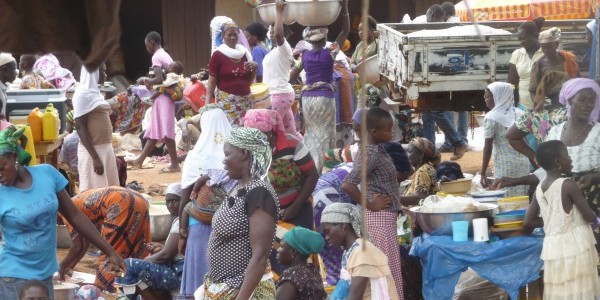 There we were! We were semi-doctors who would have to do with tropical diseases. A little bit scary, I have to admit. The first week we were a bit bewildered and accompanied the big black doctor of the West Gonja Hospital, a rural hospital in Damongo. The two brand new ‘junior-doctors’ gave each other looks of amazement, bewilderment and digust. When we discovered that almost every complaint could be caused by malaria we were able to work on our own. In shifts of 5 weeks we were responsible of the children’s, men’s and women’s ward. In the afternoon we worked at the outpatient department where we saw a lot of tropical diseases; malaria, tuberculosis, dysentery, HIV/AIDS, hepatitis B/C, typhoid, dehydration and scrotal groin ruptures which were as big as a soccer. You are always a bit confused when someone comes to you with such a problem. The way of telling their complaints is also a bit different from the way you’re used to: ’Oh doctor, my body is always hot!’(read: fever).
There we were! We were semi-doctors who would have to do with tropical diseases. A little bit scary, I have to admit. The first week we were a bit bewildered and accompanied the big black doctor of the West Gonja Hospital, a rural hospital in Damongo. The two brand new ‘junior-doctors’ gave each other looks of amazement, bewilderment and digust. When we discovered that almost every complaint could be caused by malaria we were able to work on our own. In shifts of 5 weeks we were responsible of the children’s, men’s and women’s ward. In the afternoon we worked at the outpatient department where we saw a lot of tropical diseases; malaria, tuberculosis, dysentery, HIV/AIDS, hepatitis B/C, typhoid, dehydration and scrotal groin ruptures which were as big as a soccer. You are always a bit confused when someone comes to you with such a problem. The way of telling their complaints is also a bit different from the way you’re used to: ’Oh doctor, my body is always hot!’(read: fever).
At the beginning of our internship malaria was the main reason people were recorded in the hospital. This resulted in a department with 35 ‘hot’, ‘convulsing’ children with diarrhoea. After doing the ‘wardrounds’ we had to look for the doctors ourselves to discuss some patients with them. They don’t know ‘big visits’ in this hospital. An advantage of this was that we were able to work on our own in no-time, but also we had to. This helped us when half of us went to ‘on call duties’. Together with Ghanaian nurse-practitioners we did in turn the night- and weekend-shifts of 72 hours. During a night-shift you could face a farmer with a snake bite, a sick baby, a boy with sickle cell crisis, a hunter with a shot wound, victims of a motor accident, a dehydrated girl or a drunk man. Of course we also saw some ‘normal’ diseases like tonsillitis and lumbago.
Because there is a lack of availability of diagnostic methods, we learned to trust our own clinical view. Luckily the doctors were (almost) always available for advice, and of course for operations. We were also confronted with the phenomenon ‘candlelight consultation’. Because in Ghana there are periods of electricity saving, ones in 3 days we had no electricity. The most difficult (but ridiculous) part of this internship was communication. Everyone was facing a language barrier, not only us as white semi-doctors. In Ghana 35 languages are spoken. Luckily patience and signs helped a lot.
Very intense was the confrontation with misery and death. People die of diseases we, in the West, could treat easily. The resigned attitude of the Ghanaian people helped us to accept that this is part of life here. Besides the wards and OPD (outpatient department) work, we also had to do ‘mortality meetings’ and a CAT (Critical Appraisal of a Topic) to successfully finish the GEZP. During a workshop about the prevention of infections we were able to show them our presentation abilities.
The 360ᵒ- feedback was filled in at every department, with hilarious comments like ‘Simon loves his nurses and they love him’ (professional behaviour!). It has been a great and educative experience. Though, now in our last week, we are looking forward to Dutch cheese and ‘frikadellen’. We are definitely going to miss life and working here. To say in good Ghanaian: it was sometimes struggling, but we were managing!

You must be logged in to post a comment.